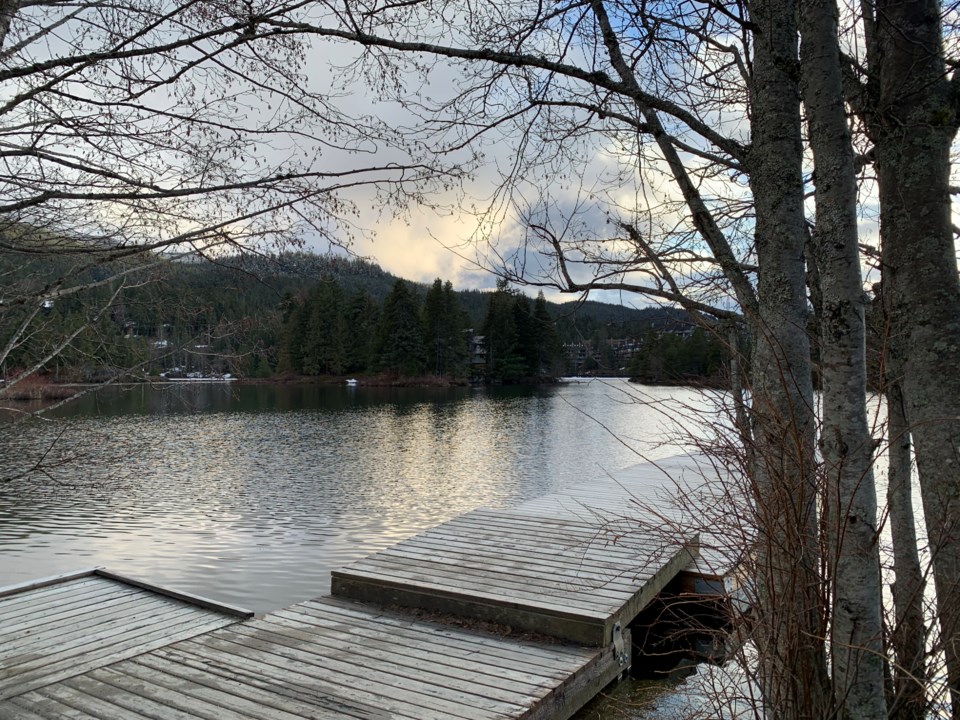On a clear, sunny day in the middle of March, Whistler’s Jack Traa witnessed an incident at Alpha Lake that raised some concern. While walking in the nearby dog park, he noticed a woman pleading with her canine to return after it had chased a group of geese onto the semi-frozen ice.
“The dog kept running and proceeded to run around the lake, and just when you think it’s going to come off the lake and back onto the dock, well, then the geese do a second lap, and the dog continues to follow them around again and land on the far side of a bit of open water,” Traa said. “And that’s where the dog continued across the lake and right into the open water.”
Once it became clear the dog would not be able to climb out of the lake on its own, its two owners, a woman and a man, immediately took off from the dock to save their dog from the frigid water, about 200 feet from the edge of the dock. Although much of the lake was still covered in ice, rising spring temperatures made walking on the lake inadvisable.
Traa called 911 for assistance, but, fortunately, emergency services were not required, and the couple managed to rescue their dog from the chilly waters. But it wasn’t without a cost. During the rescue, the woman ended up in the lake, and although she eventually pulled herself to safety, she emerged soaked and shivering.
“Fortunately, they had driven to Alpha Lake Park. So, we got her in pretty good shape. She was dry and feeling OK now, so we got her into her car, and they hung out there for a little while. So, it turned out OK: they had their dog, and they were safe,” Traa said.
The outcome turned out to be the best-case scenario, with the woman avoiding hypothermia—or worse, drowning.
Two weeks later, Traa learned that another dog had fallen into Alpha Lake and had to be rescued by a Whistler Fire Rescue Service crew. (A representative for the fire department was not available for comment before press time,)
These two close calls inspired Traa to speak up in an effort to raise awareness of the early-spring conditions on Whistler’s lakes before something more serious occurs. He brought his concerns and a few ideas to the Resort Municipality of Whistler’s April 3 council meeting.
Traa’s recommendations included installing personal flotation devices along the Alpha Lake shoreline; installing more signage detailing the dangers of thin ice; erecting a temporary barrier during unsafe conditions; and providing more communication around the threat of thawing lakes.
According to RMOW manager of legislative services Pauline Lysaght, the municipality is considering these recommendations and believes communication is the best tool to avoid future accidents.
“We were very lucky in both of these cases that they were both successful, and as you pointed out, the fire department did a fantastic job. We are discussing this between our fire rescue services, our parks operation team, and almost more importantly, our communications department, because this really is a scenario where education and communication is one of our best tools,” Lysaght said at the council meeting.
“It’s at that time of year right now where it could be staff, it could be visitors, it could be residents; they’re just not aware it is unsafe, and there’s always going to be that time at the early end of late winter.”
The Canadian Red Cross advises that ice should be at least 15 centimetres thick for walking or skating alone, 20 cm for group skating or games, and 25 cm for snowmobiles.
Mayor Jack Crompton noted that people should stay off all ice-covered lakes in Whistler as temperatures rise this spring, and immediately call for emergency support if they see someone in distress.
“Lake rescue should be done by professionals, and calling 911 is the right approach. If you see someone in distress, we have an incredibly skilled team at the Whistler Fire Rescue Service, who are equipped to do this work,” he said.
For more ice safety tips, visit redcross.ca.




